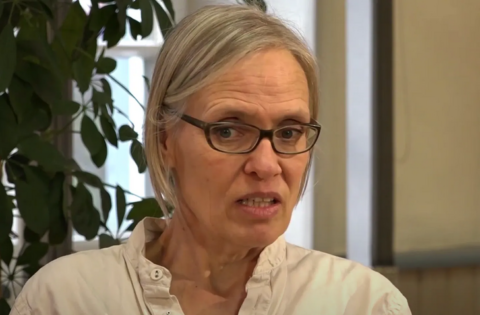Charlie Dean Archives
Published Aug 10, 2013http://archive.org/details/Woodwork1940
Woodworking in mills, construction and cabinetmaking.
CharlieDeanArchives – Archive footage from the 20th century making history come alive!
October 5, 2024
The Woodworker (1940) – Vocational training film
September 30, 2024
British and Australian schools are teaching boys to hate themselves
Janice Fiamengo discusses the sort of things British and Australian boys are being taught about themselves and their role in society:
For years, feminists in the English-speaking school systems have done everything they can to psychologically destroy a generation of boys, calling their masculinity “problematic”, “hegemonic” and “toxic”.
At their least malign, feminist teachers have made it clear to boys that their perspectives and experiences aren’t as important as those of girls. Many businesses and organizations support programs aimed at girls’ academic success; there are no equivalent programs for boys. When study after study shows boys lagging behind girls in school, many feminists don’t even pretend to care, blaming the boys, as did Australian feminist Jane Caro, for their alleged privilege. Such ideologues continue to call for more feminist teaching, and moreover take direct aim at schoolboys’ maleness in what scholar Paul Nathanson has identified as a form of identity harassment, a pervasive psychological assault that creates doubt, shame, and alienation.
Under the feminist model, boys learn from a young age that their sex is responsible for violence and other serious harms, and that they must take personal responsibility for it. A few years ago, it came to light that the female principal of an Australian school thought it a good idea to hold an assembly in which the boys were to apologize for male misbehavior to the girl next to them. Naturally, no girls are ever expected to apologize to boys for the misdeeds of the female sex.
Calls regularly circulate, as in the West Australian‘s “How We Stop This Kid Becoming a Monster“, for teaching to address the problem of predatory masculinity. Unless the feminist deprogrammers can get to work in the early years, we’re told, the boys will succumb to their inner monster. Boys learn that they can hurt girls and women even without meaning to, just by looking at them or holding traditional views. As we’ll see, any boy who objects to his own vilification will learn that objecting itself is a technique of domination.
Teaching Toxic Masculinity
A recent report on UK schools provided a glimpse into what feminist instruction looks like, revealing that terms such as “hegemonic masculinity” and “toxic masculinity”, until a decade ago part of the radical feminist fringe, are now in the mainstream of pedagogy even in the lower grades.
The Family Education Trust surveyed materials used by UK schools in their sex education classes. Out of 197 schools that responded to a request for information (more than 100 did not respond), 62 schools confirmed that they were teaching about toxic masculinity. 10 schools even admitted to teaching that “men and boys possess traits that are inherently toxic and negative for society“. (One would be relieved to hear that the principals of such schools and all participating teachers were immediately sanctioned, or at least told to stop such claptrap — but of course such has not occurred.)
One slide from a lesson on toxic masculinity stated that while “masculinity in and of itself is not necessarily a harmful thing […] the way that masculinity is traditionally defined in society can be problematic”. Some of the materials don’t even make sense, as for example the statement that traditional masculine traits “can be limiting for women, girls and other people who don’t identify as men, who are not expected to display these traits”.
September 23, 2024
In Toronto, school kids are being used as pawns in political protests
The Toronto District School Board has some serious issues if a recent high school “field trip” to a political protest is typical of how the board’s employees are allowed to insert their own political agenda into the teaching process:
There were some parents who opted out of allowing their children to participate in a Toronto District School Board (TDSB) sanctioned field trip to observe (not participate) in a public protest. Parents were informed that the event at Grange Park in Toronto involved the Grassy Narrows First Nation’s decades-long struggle with mercury contamination caused by industry. However, they should have taken this proposed field trip as a major red flag. Indeed, according to Spadina-Fort York MP Kevin Vuong, “What the TDSB teachers did was deceitful and unconscionable”.
When I was a kid, my school never attended a protest. And before last Wednesday, I’ve never heard of any school ever planning such an inappropriate field trip – that ended up being used by the ultra-woke TDSB as an excuse to indoctrinate children into social justice activism (which entails the labelling of all white/Jewish children as racists, colonizers, and settlers on stolen land). How many TDSB parents were even aware of what they were signing up for? It appears that many knew of the general shape of things – which had something to do with Grassy Narrows and mercury poisoning – but no parent could have known about the anti-Israel / anti-Semitic component (a mainstay of social justice), which appeared to be the focal point, eclipsing anything to do with Canadian First Nations.
Indeed, the email from the TDSB explained that the protest event was an “educational opportunity … to learn about Indigenous activism, environmental justice and human rights”. The red flag would have been enormous and flapping vigorously in a strong wind for those parents who are initiated into the tenets of critical social justice theory. To those parents, participation in woke activism is a hard hell no. However, many families are still oblivious, or maybe have misunderstood the intentions of the TDSB, or maybe just don’t quite get what critical social justice is. They are unaware that far too many school administrators, trustees, and teachers have decided that their priority is transforming society through a cultural revolution, not educating the young. This, of course, involves transforming children.
The letter to parents assured them that their children would not be participating in the protest. Students would be on site only to observe. However, videos have emerged on social media of middle school aged children marching alongside anti-Israel protestors. Understandably, many parents now feel betrayed. In my view, they should have seen this coming. The TDSB is literally infested with anti-Semetic black radicals and other such woke activists who follow the same identity politics playbook which entered North America through the period of violent 1960s era black radicalism. (I refer the reader to Cedric Robinson’s volume Black Marxism: The Making of the Black Radical Tradition. And, to Dr. Scott Miller’s essay published in these pages “A Moral Chimera: Diversity, Illiberal No-White-Male Policies and the Power of the Black Radical Tradition“. And lastly, if you want to see black radicals in action, read my piece, “Exploring The Grievance Pathway Of Anti-Racism“, on a Parents of Black Children meeting I attended).
Concerning those videos of the protest which circulated social media sparking outrage amongst parents, according to the Toronto Sun, “footage showed students marching alongside flag-waving Elementary Teachers of Toronto members, while a masked woman in a white ‘Justice for Grassy Narrows’ shirt shouted anti-Israel chants into a megaphone”.
CG Idit Shamir (Consul General @IsraelinToronto) posted the following to X (I completely agree with her sentiment):
“Shocking. 7th and 8th graders from public schools in Toronto were taken yesterday on a Toronto District School Board (TDSB) -approved field trip—not to a museum, but to march in a political protest where they chanted pro-Palestine slogans. Adults in keffiyehs and face coverings led the way, while young minds were subjected to a one-sided political narrative.
“The @tdsb has crossed a line. Children get sent to school to learn; they should NEVER be forced to participate in political protests. It’s not just that they’ve taken a side—it’s that they have utterly disregarded the rights of pro-Israel and Jewish students and staff, along with any commitment to truth and balance. This isn’t education; it’s indoctrination—it’s an affront to the very purpose of education.”
MPP Goldie Ghamari, also had a strong reaction:
“What the actual f**k is going on with @tdsb educators in Toronto?
This isn’t 1944 Nazi occupied Germany.
This is 2024 in Canada.
This antisemitic behaviour is unacceptable.
If you stay silent after reading this, you’re part of the problem and need to hang your head in shame.”
Berlin’s Der Tagesspiegel wants to help you keep your kids from the perils of right-wing ideology
eugyppius on the help Berlin’s leading daily newspaper is offering to their readers whose kids are hearing the siren call of non-progressive politics:
This obviously charming, cheerful and not at all withered or overwrought woman is named Eva Prausner. She is a social worker, and she directs something called the “Project for Strengthening Parents“, which provides “Training, networking, and counselling in the area of family and right-wing extremism”. This means that she runs around telling parents what to do when they suspect their children are succumbing to political wrong-think. And this in turn makes Frau Prausner the woman of the hour, for never before in the history of the Federal Republic have so many undemocratic children bloomed under the noses of so many upstanding democratic parents.
It is very hard to understand how this happened. The leftists and the Greens, after all, have been doing the Lord’s work teaching leftism and Greenism in schools for decades now, but despite their valiant efforts we are rapidly losing our youth to malign antidemocratic forces. It can’t be that elevating leftoid lunacy into an establishment ideology has backfired, transforming the once cool, counter-cultural left into a political movement for middle-aged scolds and schoolmarms – the kind of thing from which teenagers flee in terror. No, nothing could be less plausible. The real reason for the pandemic of right-wing children must simply be that we haven’t indoctrinated them enough. If parents will not do their part and bring indoctrination also to the home, our democracy will collapse and it will be 1933 all over again, just like it was 1933 all over again two weeks ago after the elections in Thüringen and Saxony.
For these reasons, Der Tagesspiegel, Berlin’s largest daily newspaper, interviewed Prausner on her advice for parents who find themselves forced to deal with their evil, right-leaning spawn. The product is a prescient write-up for the ages bearing the headline “Help, my child is turning right-wing! Eight tips for democratic parents with undemocratic children“.
The rightward shift in East Germany is a shift above all among the youngest, as the elections in Saxony and Thüringen have shown. One in three young people there voted for the far right. In Thüringen, as many as 38% of 18- to 34-year-olds cast their ballot for the AfD – more than in any other age group. Many a parent who values living in a democracy will have wondered: “What have we done wrong?”
In Brandenburg, too, it is becoming clear that even the youngest are now leaning towards the right. In the under-16 vote a week before the state election, the AfD came out on top with around 30% … In the state elections on 22 September, the AfD could become the strongest force, thanks in part to young first-time voters.
Do parents still have any influence over their AfD-voting children?
Alas, Prausner is not very certain that they do, but she believes that democratic parents “should at least try” to rescue their children from the grave heresy of voting for the wrong political parties. Children in Brandenburg are particularly endangered, because Brandenburg is largely rural, and Prausner has discovered that the countryside is absolutely dripping with “condensed prejudicial attitudes”. There is so much racial prejudice in the Brandenburg air that it is collecting on cool surfaces, like windows and beer glasses, that is how bad things are there. Also all children everywhere are in danger because the internet is a powerful right-wing force that helps bad organisations like the AfD pump their fascist mind virus directly into millions of young yet-forming cerebral cortices.
September 20, 2024
QotD: The Matrix, Harry Potter and “The One Pop Culture Thing”
Part of the appeal of Harry Potter must be that can somehow be intellectualized, though — at least, if the number of people incorporating it, in all apparent seriousness, into college classes can be believed. Here again, I’m not talking the English Department, which might have a legitimate reason — to study the narrative technique or whatever (for certain stretched-farther-than-Trigglypuff’s-sweatpants values of “legitimate”, anyway). I mean classes like “PHIL 101: Harry Potter and Philosophy”, which started showing up first in goofy California colleges, then all over the damn place, somewhere around 2002.
That certainly seems to be the appeal of The Matrix, and indeed The Matrix stopped being The One Pop Culture Thing very quickly, I hypothesize, because it made “intellectualizing” it too easy. The Matrix is pretty much just Jean Baudrillard: The Movie, and while that’s fun and even useful — Baudrillard did have a point, despite it all — it’s just too clever … by which I mean, The Matrix did too much of the heavy lifting, so that you don’t get too many Very Clever Persyn points for noting that we’re all, just, like, simulations in other people’s minds, dude. Descartes can go fuck himself; Keanu Reeves has solved the mind-body problem with kung fu.
Also, Baudrillard-lite is everywhere now. We’re all Postmodernists, in the same way we’re all Marxists, so even the kids who slept through most of their one required Humanities course has at least vaguely heard of this stuff. A show like True Detective, on the other hand, hearkens back to much older philosophy — as tiresome as the wannabe-Foucaults were back in the late 1980s, as a culture we’ve pretty much forgotten about them, so the brooding wannabe existentialist douchebag seems new now. I just googled up “best true detective quotes”. Here’s a small sampling:
This is a world where nothing is solved. You know, someone once told me time is a flat circle. Everything we’ve ever done or will do, we’re gonna do over and over and over again.
Also:
… to realize that all your life, all your love, all your hate, all your memory, all your pain, it was all the same thing. It was all the same dream you had inside a locked room — a dream about being a person. And like a lot of dreams, there’s a monster at the end of it.
That “flat circle” thing is a direct quote from Schopenhauer, I’m pretty sure, and the idea of “eternal recurrence” came from Vedic philosophy via him to Nietzsche. Here, for instance, the Manly Mustache Man summarizes the plot of True Detective, season 1:
What, if some day or night a demon were to steal after you into your loneliest loneliness and say to you: “This life as you now live it and have lived it, you will have to live once more and innumerable times more; and there will be nothing new in it, but every pain and every joy and every thought and sigh and everything unutterably small or great in your life will have to return to you, all in the same succession and sequence — even this spider and this moonlight between the trees, and even this moment and I myself. The eternal hourglass of existence is turned upside down again and again, and you with it, speck of dust!”
Would you not throw yourself down and gnash your teeth and curse the demon who spoke thus? Or have you once experienced a tremendous moment when you would have answered him: “You are a god and never have I heard anything more divine.” If this thought gained possession of you, it would change you as you are or perhaps crush you. The question in each and every thing, “Do you desire this once more and innumerable times more?” would lie upon your actions as the greatest weight. Or how well disposed would you have to become to yourself and to life?
Here again, I don’t blame the average HBO viewer for having their minds blown by this (or at least pretending to), but people with PhDs should damn well know better. This is existentialism for dummies, but since they spent most of their off hours in grad school reading Harry Potter …
Severian, “The One Pop Culture Thing”, Rotten Chestnuts, 2021-09-16.
September 14, 2024
QotD: Academia
… the ivory tower — that is to say, an institution where all the drama is entirely self-manufactured by vain, petty people who think they’re much smarter than they actually are. That rules out most genres people actually enjoy reading right there. There’s comedy, I guess, and I considered giving that a go, but the modern university is beyond parody. Maybe Joseph Heller at his absolute apex could pull it off, but I’m no Joseph Heller. Nor am I Franz Kafka, who is the onlie begetter of the only other genre that would cover academia: Surrealist, absurdist, dystopian horror. The adjective “Kafkaesque” describes graduate school perfectly, no doubt, but if you somehow need a dose of that, just go read The Trial. Or watch the film Brazil, and imagine everyone is twice as polysyllabically self-important …
Severian, “Storytelling Fail”, Rotten Chestnuts, 2021-07-13.
September 2, 2024
August 30, 2024
The urge to power
At Mindset Shifts, Barry Brownstein explains why the urge to gain power over other people is particularly strong in those who don’t have meaningful lives of their own:

King Louis XIV, the “Sun King”.
Portrait by Hyacinthe Rigaud (1659-1743) sometime in 1700 or 1701 from the Louvre via Wikimedia Commons.
One of my more memorable exchanges with a student came in a principles of economics class. Part of the assignment for that week was chapters from Matt Ridley’s The Rational Optimist. Ridley compared the living standards of an average worker today with those of The Sun King, Louis XIV, in 1700. Some of my more ahistorical students were incredulous at Ridley’s description of the grinding poverty of the average person just a few centuries ago.
The King had an opulent lifestyle compared to others. Louis had an astonishing 498 workers preparing each of his meals. Yet his standard of living was still a fraction of what we experience today.
Ridley outlined the miracles of specialization and exchange in our time — an everyday cornucopia at the supermarket, modern communications and transportation, clothing to suit every taste. If we remove our blinders and see how many individuals provide services to us, Ridley concludes we have “far more than 498 servants at [our] immediate beck and call”.
Then, the memorable exchange occurred. One student shared that he would prefer to live in 1700, if he had more money than others and power over them. My first reaction was amusement; I thought the student was practicing his deadpan humor skills. He wasn’t. For him, having power was an attribute of a meaningful life.
If only my student’s mindset were an aberration.
During the reign of Louis XIV, French mathematician and philosopher Blaise Pascal diagnosed why some lust for power. In his Pensées, Pascal wrote, “I have often said that the sole cause of man’s unhappiness is that he does not know how to stay quietly in his room”. Pascal explained that, out of the inability to sit alone, arises the human tendency to seek power as a diversion.
Pascal asks us to imagine a king with “all the blessings with which you could be endowed”. A king, Pascal told us, if he has no “diversions” from his thinking, will “ponder and reflect on what he is”. Pascal’s hypothetical king will be miserable because he “is bound to start thinking of all the threats facing him, of possible revolts, finally of inescapable death and disease”.
“What people want is not the easy peaceful life that allows us to think of our unhappy condition.” That is why “war and high office are so popular”, Pascal argued.
Pascal argues individuals seek to be “diverted from thinking of what they are”. I would argue a better choice of words is what they have made of themselves.
I’ll let the reader decide how many modern politicians Pascal’s ideas apply to. With Pascal’s insight, we understand why conflict is a feature of politics and not a bug.
Pascal spares no one’s feelings. Some “seek external diversion and occupation, and this is the result of their constant sense of wretchedness”. For them, “rest proves intolerable because of the boredom it produces. [They] must get away from it and crave excitement.”
Let that sink in. A person able to exercise coercive power can use their morally undeveloped “wretched” mind to create endless misery for others merely because exercising power distracts them from their failures as human beings.
August 21, 2024
QotD: Cyclists at “Flyover State”
Compared to your average college town cyclist, Ed Begley Jr. is a paragon of humility. I’ve never understood it, but for so many of my fellow “Americans”, there seems to be this all-purpose Asshole License you can issue yourself. It’s kinda like the “White Privilege” card, in that no one has ever seen one, but unlike “White Privilege”, the people who imagine themselves possessors of the Asshole License use it, every minute of every day. Did the seventeen year old in your life just read The Fountainhead or The Catcher in the Rye? Then you know what I mean — that kid just issued himself the Asshole License. Obviously getting dreadlocks (if you’re White) or existing (if you’re black) grants you the Asshole License, as does “passing a Gender Studies course” or “realizing that Israel’s actions don’t always match up with its rhetoric”.
But, my friends, the easiest way to obtain an Asshole License is to take up cycling. It must be something about those doofy helmets — anyone willing to wear what looks like a giant athletic supporter jammed down over his eyebrows has to be some kind of douchebag to begin with, and since nut-squashing lycra pants must squeeze out whatever residual testosterone they had left, it’s no wonder that cyclists are such bitches.
Severian, “Luxury Beliefs”, Rotten Chestnuts, 2021-06-03.
July 27, 2024
Cancelling Orwell (again)
In The Daily Sceptic, Paul Sutton recounts a recent discussion with some Oxford graduate students where the topic of George Orwell came up:
The students maintained that the important thing is quality of writing but, paradoxically, this can only be judged by a strict contemporary “evaluation” of any Right-wing or outdated views. Inevitably, this contextualisation then reveals that said writers are “problematic” and “not as good as XYZ” – usually some figure who fits their sensibilities, and coincidentally one who’s almost always female – or at least better suited to the diversity required by these commissars.
So far, so well known and wearily familiar. The absolute impossibility of literature under such a mindset – one enthusiastically endorsed by graduate students who professed to live for literature – is utterly depressing. We’re in effect dealing with its cancellation.
I made a perfunctory effort in observing their complete inconsistency, but things got more interesting when Orwell was discussed. Of course, Orwell famously wrote against their stand, not least in his brilliant defence of Kipling’s literary merit and his refusal to allow orthodoxy to dictate his aesthetic preferences, in “Benefit of Clergy“.
Unfortunately, Orwell’s stint in the Burmese Imperial Police made him a despicable figure to the students, little better than a Waffen SS or Gestapo officer. True, he’d belatedly retrieved himself by his “eventual writing” in the 1940s, but he’d spent many years performing the dirty work of the British Empire. His famous essay, “A Hanging“, showed him enthusiastically hands on at it.
I’d honestly never heard such a narrow and limited view, and was intrigued. As a preposterous misrepresentation, it needs little rebuttal. “A Hanging” is indeed a brilliantly disturbing account of an Indian murderer being hanged, a man who’d have been executed at that time in any country. The essay explores the deep unease Orwell felt about his role, so it’s a lie to claim it shows him uncritically doing his job, let alone revelling in his exertion of British authority.
Such an interpretation shows a shocking lack of understanding. As does the idea that Orwell only recanted any pro-Imperial views in the 1940s; his underrated Burmese Days was published in 1934 and he wrote extensively about his disgust for the job he did in the late 20s and 1930s. Of course, he didn’t only feel disgust, nor would he pretend that the British brought only misery and were unique as imperial exploiters.
What I’m most interested in is how an alternative Orwell was then offered up, a writer who’d accepted the British Empire was “problematic” yet offered a nice comforting view of how nice and comforting life can be – if you agree with the progressives, that is.Step forward Jan Morris and his trilogy Pax Britannica. Now, I haven’t read this non-fictional account of the British Empire but from background knowledge, it’s not in any way a replacement for Orwell or even remotely comparable. It’s an exhaustive historical work, not a personal creative one. But this trilogy was extolled by the students as what Orwell should have done when discussing empire. There was the implication that Orwell could now be – somewhat thankfully – ignored.
Bizarrely, the Englishman then introduced Joyce, first saying that the man was a lifelong sponger who’d have probably fleeced him, but as a writer was the very model of a pan-European, liberal and open to all cultures. Again, the grubby contradictions and sheer banality of such a perspective are eye-popping – from a DPhil student in perhaps the country’s finest university.
And I’ve a nagging feeling that Jan Morris – a famous case of gender realignment (he “transitioned” to female in 1972) – was picked for the “acceptable author” reasons. That’s the problem with “author context” vetting – as with “diversity hires”. Much as I’ve enjoyed Morris’s travel writing, especially Oxford, it’s staggering for this author to be proposed as some alternative to Orwell! Not only in terms of obvious lesser importance, but they’re not remotely comparable in terms of genre or aims. How could any serious reader – let alone one at a leading university – talk such gibberish?
QotD: The academic “grinder”
A “grinder” isn’t merely a guy who studies hard. I knew a dude in college, for instance, who had such phenomenal self-discipline that he’d walk off the basketball court practically in the middle of a game. It’s 7:30, so it’s study time; if we’re still playing at 10, he’ll join back in.
Looking back on it, homeboy was more than a little “on the spectrum”, as the kids say nowadays, but he wasn’t a grinder. Nor do long hours, in themselves, make a grinder — med students, for instance, work in the neighborhood of 60-75 hours a week, but though there are lots of grinders in medical school, not all med students are grinders. Long hours in the lab just go with the territory.
Indeed, actually working hard is almost an exclusion criterion for grinder-ness. Grinders ostentatiously spend many, many hours hitting the books, but it’s almost literally hitting the books. They “work” the Latin way — lots of activity, almost no accomplishment. Put a big honking stack of the largest, mustiest tomes you can find in front of you in your study carrel. Pick one up, flip through it, take one note, then rotate it to the bottom of the stack. Do this for hours on end, always making sure that your stack is flush with the wall, so that everyone in the room can see how many books you have, and how diligently you’re “taking notes”. That’s a grinder.
And cheat your ass off, it goes without saying. In my day, when dinosaurs roamed the earth and “the Internet” was a way for Defense Department nerds to exchange missile schematics with one another, the preferred method was with a graphing calculator. Your dishwasher has more hard disk space than those things, but the mere presence of memory capacity made it ideal for cheating, providing you could come up with some elaborate shorthand to cram all the material in … and providing, of course, you could use it. My friends, you have never seen true comedy until you’ve seen some sweaty Chinese kid begging the teacher to be allowed to use his graphing calculator in Engrish class. Quick, what’s the cosine of MacBeth?
And speaking of begging, that’s the final diagnostic criterion. Have you polished so many apples, your fingers are permanently stained red? Are you so far up the guidance counselor’s ass that you’re banging your skull on her uvula? Have you kissed so much butt, you’ve got a mouth like a lamprey? Would you cheerfully murder your best friend’s dog if it would get you an extra 0.02 on your GPA? Then you, my friend, are a grinder.
Severian, “The Grinder Mindset [expanded]”, Rotten Chestnuts, 2021-06-22.
July 21, 2024
QotD: There’s no recovery mode from being a Basic College Girl
Do you have any examples of BCGs recuperating?
Sadly, very few. Part of this is just in the nature of the biz — I don’t see too many former students out and about, since they all leave College Town for the big wide world — but I do know this: Scratch a Karen, find a BCG. In fact, you could go so far to say that “Karen” simply IS the BCG after she hits The Wall. The faster the impact, the bigger the Karen (this is a testable hypothesis — given that our gal Taylor Swift is currently impacting The Wall at about Mach 3, if I’m right, she’ll soon unleash the kraken of Karens on an unsuspecting world).
I also strongly suspect that BCGs can’t recover. As any shrink will tell you, Narcissistic and Borderline Personality Disorders are almost impossible to treat. For one thing, treatment requires believing that you have a problem, and believing you don’t have a problem is pretty much diagnostic of those two syndromes. And while I’m not sure the BCG is clinically diagnosable with either of those, what they actually are is close enough that I’m betting whatever therapies “work” on actual clinical cases would “work” on them … but see above.
Finally, I guess I can’t really blame the BCG for not realizing she’s got a problem, because she obviously doesn’t have a problem. Look around — society rewards this shit. AOC, for example, is going to be La Presidenta por Vida de los Estados Unidos here in a decade or so; if that’s a problem, I can’t really blame them for not fixing it. Eventually, of course, reality will intrude, and your BCG will be screaming for a real man to come save her … but, thanks to her BCG antics, there won’t be any real men around. Or, you know, we’ll all be in the OPFOR, so good luck with that, beeyatch.
Severian, “Friday Mailbag /Grab Bag”, Rotten Chestnuts, 2021-06-25.
July 20, 2024
Counting citation numbers in “Chomskys”
The latest anonymous reviewer in Astral Codex Ten‘s “Your Book Review” series considers the work of Noam Chomsky, and notes just how his works dominate the field of linguistics:

Noam Chomsky speaks about humanity’s prospects for survival in Amherst, Massachusetts, United States on 13 April 2017.
Original photo by Σ, retouched by Wugapodes via Wikimedia Commons.
You may have heard of a field known as “linguistics”. Linguistics is supposedly the “scientific study of language“, but this is completely wrong. To borrow a phrase from elsewhere, linguists are those who believe Noam Chomsky is the rightful caliph. Linguistics is what linguists study.
I’m only half-joking, because Chomsky’s impact on the study of language is hard to overstate. Consider the number of times his books and papers have been cited, a crude measure of influence that we can use to get a sense of this. At the current time, his Google Scholar page says he’s been cited over 500,000 times. That’s a lot.
It isn’t atypical for a hard-working professor at a top-ranked institution to, after a career’s worth of work and many people helping them do research and write papers, have maybe 20,000 citations (= 0.04 Chomskys). Generational talents do better, but usually not by more than a factor of 5 or so. Consider a few more citation counts:
- Computer scientist Alan Turing (65,000 = 0.13 Chomskys)
- Neuro / cogsci / AI researcher Matthew Botvinick (83,000 = 0.17 Chomskys)
- Mathematician Terence Tao (96,000 = 0.19 Chomskys)
- Cognitive scientist Joshua Tenenbaum (107,000 = 0.21 Chomskys)
- Nobel-Prize-winning physicist Richard Feynman (120,000 = 0.24 Chomskys)
- Psychologist and linguist Steven Pinker (123,000 = 0.25 Chomskys)
- Two-time Nobel Prize winner Linus Pauling (128,000 = 0.26 Chomskys)
- Neuroscientist Karl Deisseroth (143,000 = 0.29 Chomskys)
- Biologist Charles Darwin (182,000 = 0.36 Chomskys)
- Theoretical physicist Ed Witten (250,000 = 0.50 Chomskys)
- AI researcher Yann LeCun (352,000 = 0.70 Chomskys)
- Historian and philosopher Hannah Arendt (359,000 = 0.72 Chomskys)
- Karl Marx (458,000 = 0.92 Chomskys)
Yes, fields vary in ways that make these comparisons not necessarily fair: fields have different numbers of people, citation practices vary, and so on. There is also probably a considerable recency bias; for example, most biologists don’t cite Darwin every time they write a paper whose content relates to evolution. But 500,000 is still a mind-bogglingly huge number.
Not many academics do better than Chomsky citation-wise. But there are a few, and you can probably guess why:
- Human-Genome-Project-associated scientist Eric Lander (685,000 = 1.37 Chomskys)
- AI researcher Yoshua Bengio (780,000 = 1.56 Chomskys)
- AI researcher Geoff Hinton (800,000 = 1.60 Chomskys)
- Philosopher and historian Michel Foucault (1,361,000 = 2.72 Chomskys)
…well, okay, maybe I don’t entirely get Foucault’s number. Every humanities person must have an altar of him by their bedside or something.
Chomsky has been called “arguably the most important intellectual alive today” in a New York Times review of one of his books, and was voted the world’s top public intellectual in a 2005 poll. He’s the kind of guy that gets long and gushing introductions before his talks (this one is nearly twenty minutes long). All of this is just to say: he’s kind of a big deal.
[…]
Since around 1957, Chomsky has dominated linguistics. And this matters because he is kind of a contrarian with weird ideas.
July 15, 2024
July 5, 2024
“Private property rights? How do they work?” (U of T students, probably)
In The Line, Josh Dehaas rounds up the concept of private property rights for the University of Toronto students (and non-student antisemitic fellow occupiers) who have been squatting for Palestinian terrorists on university property for the last while:

University College, University of Toronto, 31 July, 2008.
Photo by “SurlyDuff” via Wikimedia Commons.
After Justice Koehnen delivered his ruling Tuesday ordering the occupiers to dismantle the People’s Circle for Palestine at the University of Toronto, one of the protesters accused the school of hypocrisy.
“It’s quite interesting that a university that claims to practice decolonization is falling back on this claim of private property,” master’s student Sarah Rasikh told a journalist on the day before the students began taking down their tents.
“U of T and the Court more specifically is quite literally telling Indigenous students to leave and get off of their own land,” she added.
Rasikh has a point, sort of.
As someone who did law school relatively recently, I can attest that many university professors are downright hostile to the concept of private property. They commonly claim that all of Canada belongs to Indigenous people and that Indigenous peoples don’t believe in private property. Rather, they believe in “sharing”. Decolonization therefore requires that land be treated communally, or so the theory goes. University administrators who pay lip service to the concept of decolonization shouldn’t be surprised when students try to turn theory into action.
Thankfully the law still protects private property rights. Students who didn’t get taught how that works by their professors ought to give Justice Koehnen’s decision a read.
As Justice Koehnen explained, “in our society we have decided that the owner of property generally gets to decide what happens on the property”.
“If the protesters can take that power for themselves by seizing Front Campus, there is nothing to stop a stronger group from coming and taking the space over from the current protesters,” he went on. “That leads to chaos. Society needs an orderly way of addressing competing demands on space. The system we have agreed to is that the owner gets to decide how to use the space.”
“If it is not the owner who gets to determine what happens on the property it will become a brutal free-for-all,” Justice Koehnen added.







